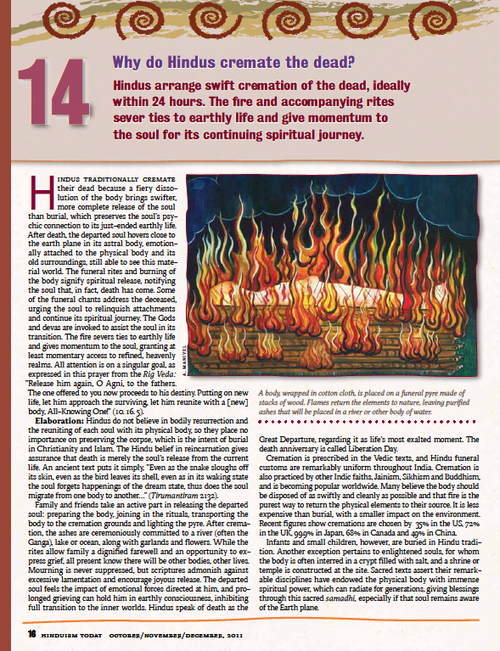Why we cremate and don't bury

Today we present the fourth and final of the new questions in our series: Hindus traditionally cremate their dead because a fiery dissolution of the body brings swifter, more complete release of the soul than burial, which preserves the soul's psychic connection to its just-ended earthly life. After death, the departed soul hovers close to the earth plane in its astral body, emotionally attached to the physical body and its old surroundings, still able to see this material world. The funeral rites and burning of the body signify spiritual release, notifying the soul that, in fact, death has come. Some of the funeral chants address the deceased, urging the soul to relinquish attachments and continue its spiritual journey. The Gods and devas are invoked to assist the soul in its transition. The fire severs ties to earthly life and gives momentum to the soul, granting at least momentary access to refined, heavenly realms. All attention is on a singular goal, as expressed in this prayer from the Rig Veda: "Release him again, O Agni, to the fathers. The one offered to you now proceeds to his destiny. Putting on new life, let him approach the surviving, let him reunite with a [new] body, All-Knowing One!" (10. 16. 5). Elaboration: Hindus do not believe in bodily resurrection and the reuniting of each soul with its physical body, so they place no importance on preserving the corpse, which is the intent of burial in Christianity and Islam. The Hindu belief in reincarnation gives assurance that death is merely the soul's release from the current life. An ancient text puts it simply, "Even as the snake sloughs off its skin, even as the bird leaves its shell, even as in its waking state the soul forgets happenings of the dream state, thus does the soul migrate from one body to another…" (Tirumantiram 2132). Family and friends take an active part in releasing the departed soul: preparing the body, joining in the rituals, transporting the body to the cremation grounds and lighting the pyre. After cremation, the ashes are ceremoniously committed to a river (often the Ganga), lake or ocean, along with garlands and flowers. While the rites allow family a dignified farewell and an opportunity to express grief, all present know there will be other bodies, other lives. Mourning is never suppressed, but scriptures admonish against excessive lamentation and encourage joyous release. The departed soul feels the impact of emotional forces directed at him, and prolonged grieving can hold him in earthly consciousness, inhibiting full transition to the inner worlds. Hindus speak of death as the Great Departure, regarding it as life's most exalted moment. The death anniversary is called Liberation Day. Cremation is prescribed in the Vedic texts, and Hindu funeral customs are remarkably uniform throughout India. Cremation is also practiced by other Indic faiths, Jainism, Sikhism and Buddhism, and is becoming popular worldwide. Many believe the body should be disposed of as swiftly and cleanly as possible and that fire is the purest way to return the physical elements to their source. It is less expensive than burial, with a smaller impact on the environment. Recent figures show cremations are chosen by 35% in the US, 72% in the UK, 99.9% in Japan, 68% in Canada and 49% in China. Infants and small children, however, are buried in Hindu tradition. Another exception pertains to enlightened souls, for whom the body is often interred in a crypt filled with salt, and a shrine or temple is constructed at the site. Sacred texts assert their remarkable disciplines have endowed the physical body with immense spiritual power, which can radiate for generations, giving blessings through this sacred samadhi, especially if that soul remains aware of the Earth plane.
One Response to “Why we cremate and don't bury”
From Our Gurus' Teachings
Archives are now available through 2001. Light colored days have no posts. 1998-2001 coming later.

July 24th, 2014 at 3:54 pm
Why do Hindus don’t cremate on Tuesdays